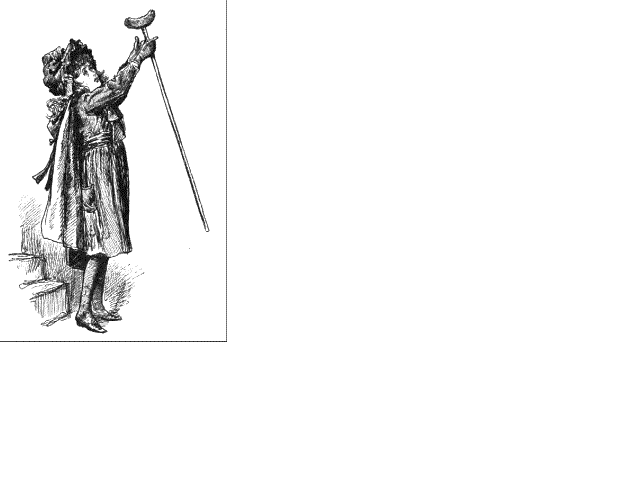On the Tuesday, as Arthur did not seem equal to more walking, I took a long stroll by myself, having stipulated that he was not to give the whole day to his books, but was to meet me at the Hall at about tea-time. On my way back, I passed the Station just as the afternoon-train came in sight, and sauntered down the stairs to see it come in. But there was little to gratify my idle curiosity: and, when the train was empty, and the platform clear, I found it was about time to be moving on, if I meant to reach the Hall by five.
As I approached the end of the platform, from which a steep irregular wooden staircase conducted to the upper world, I noticed two passengers, who had evidently arrived by the train, but who, oddly enough, had entirely escaped my notice, though the arrivals had been so few. They were a young woman and a little girl: the former, so far as one could judge by appearances, was a nursemaid, or possibly a nursery- governess, in attendance on the child, whose refined face, even more than her dress, distinguished her as of a higher class than her companion.
The child's face was refined, but it was also a worn and sad one, and told a tale (or so I seemed to read it) of much illness and suffering, sweetly and patiently borne. She had a little crutch to help herself along with: and she was now standing, looking wistfully up the long staircase, and apparently waiting till she could muster courage to begin the toilsome ascent.
There are some things one says in life----as well as things one does----which come automatically, by reflex action, as the physiologists say (meaning, no doubt, action without reflection, just as lucus is said to be derived 'a non lucendo'). Closing one's eyelids, when something seems to be flying into the eye, is one of those actions, and saying "May I carry the little girl up the stairs?" was another. It wasn't that any thought of offering help occurred to me, and that then I spoke: the first intimation I had, of being likely to make that offer, was the sound of my own voice, and the discovery that the offer had been made. The servant paused, doubtfully glancing from her charge to me, and then back again to the child. "Would you like it, dear?" she asked her. But no such doubt appeared to cross the child's mind: she lifted her arms eagerly to be taken up. "Please!" was all she said, while a faint smile flickered on the weary little face. I took her up with scrupulous care, and her little arm was at once clasped trustfully round my neck.

- She was a very light weight----so light, in fact, that the ridiculous idea crossed my mind that it was rather
easier going up, with her in my arms, than it would have been without her: and, when we reached the
road above, with its cart-ruts and loose stones----all formidable obstacles for a lame child--I found that I
had said "I'd better carry her over this rough place," before I had formed any mental connection between
its roughness and my gentle little burden. "Indeed it's troubling you too much, Sir!" the maid exclaimed.
"She can walk very well on the flat." But the arm, that was twined about my neck, clung just an atom
more closely at the suggestion, and decided me to say "She's no weight, really. I'll carry her a little further.
I'm going your way."
The nurse raised no further objection: and the next speaker was a ragged little boy, with bare feet, and a broom over his shoulder, who ran across the road, and pretended to sweep the perfectly dry road in front of us. "Give us a 'ap'ny!" the little urchin pleaded, with a broad grin on his dirty face.
"Don't give him a 'ap'ny!" said the little lady in my arms. The words sounded harsh: but the tone was gentleness itself. "He's an idle little boy!" And she laughed a laugh of such silvery sweetness as I had never yet heard from any lips but Sylvie's. To my astonishment, the boy actually joined in the laugh, as if there were some subtle sympathy between them, as he ran away down the road and vanished through a gap in the hedge.
But he was back in a few moments, having discarded his broom and provided himself, from some mysterious source, with an exquisite bouquet of flowers. "Buy a posy, buy a posy! Only a 'ap'ny!" he chanted, with the melancholy drawl of a professional beggar.
| Previous chapter/page | Back | Home | Email this | Search | Discuss | Bookmark | Next chapter/page |